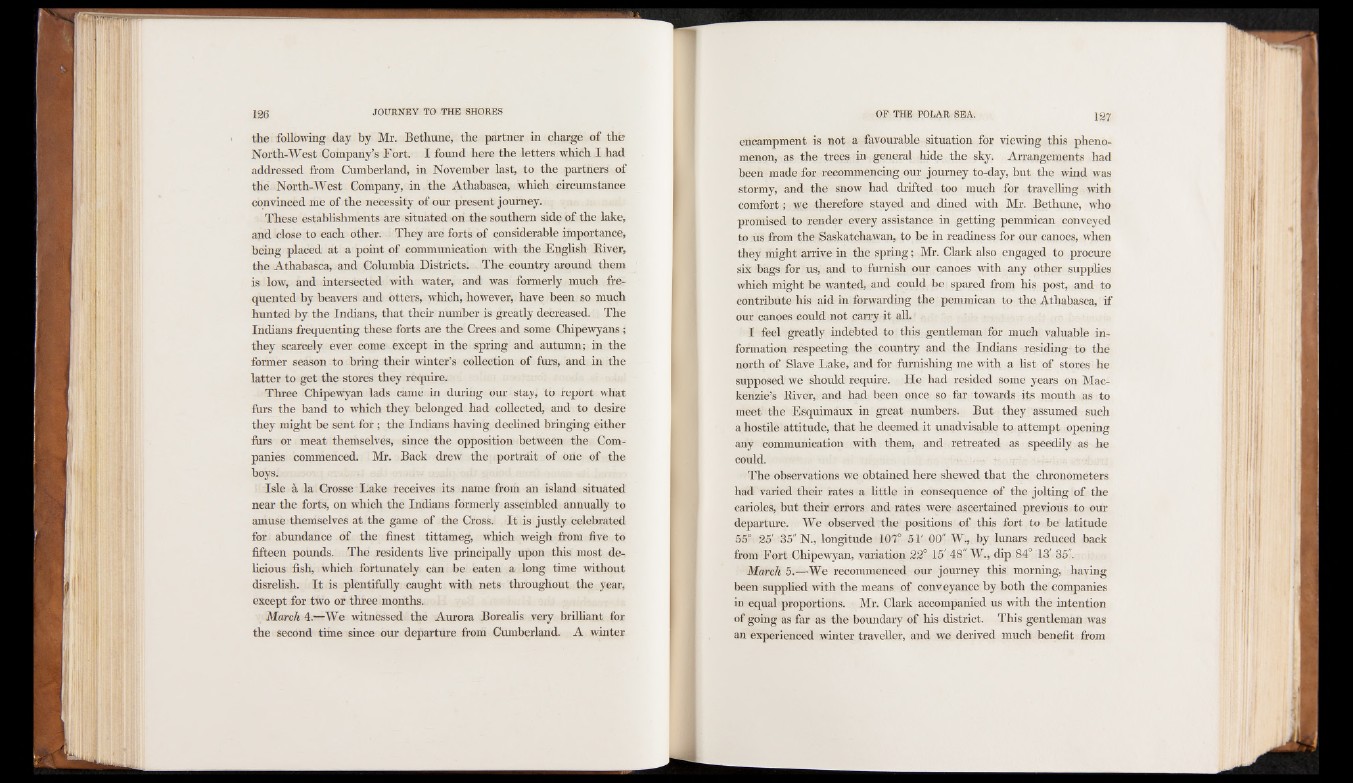
the following day by Mr. Bethune, the partner in charge of the
North-West Company’s Fort. I found here the letters which I had
addressed from Cumberland, in November last, to the partners of
the North-West Company, in the Athabasca, which circumstance
convinced me of the necessity of our present journey.
These establishments are situated on the southern side of the lake,
and close to each other. They are forts of considerable importance,
being placed at a point of communication with the English River,
the Athabasca, and Columbia Districts. The country around them
is low, and intersected with water, and was formerly much frequented
by beavers and otters, which, however, have been so much
hunted by the Indians, that their number is greatly decreased. The
Indians frequenting these forts are the Crees and some Chipewyans;
they scarcely ever come except in the spring and autumn; in the
former season to bring their winter’s collection of furs, and in the
latter to get the stores they require.
Three Chipewyan lads came in during our stay, to report what
furs the band to which they belonged had collected, and to desire
they might be sent for ; the Indians having declined bringing either
furs or meat themselves, since the opposition between the Companies
commenced. Mr. Back drew the portrait of one of the
boys.
Isle è. la Crosse Lake receives its name from an island situated
near the forts, on which the Indians formerly assembled annually to
amuse themselves at the game of the Cross. It is justly celebrated
for abundance of the finest tittameg, which weigh from five to
fifteen pounds. The residents five principally upon this most delicious
fish, which fortunately can be eaten a long time without
disrelish. It is plentifully caught with nets throughout the year,
except for two or three months.
March 4.—W e witnessed the Aurora Borealis very brilliant for
the second time since our departure from Cumberland. A winter
encampment is not a favourable situation for viewing this phenomenon,
as the trees in general hide the sky. Arrangements had
been made for recommencing our journey to-day, but the wind was
stormy, and the snow had drifted too much for travelling with
comfort; we therefore stayed and dined with Mr. Bethune, who
promised to render every assistance in getting pemmican conveyed
to us from the Saskatchawan, to be in readiness for our canoes, when
they might arrive in the spring; Mr. Clark also engaged to procure
six bags for us, and to furnish our canoes with any other supplies
which might be wanted, and could be spared from his post, and to
contribute his aid in forwarding the pemmican to the Athabasca, if
our canoes could not carry it all.
I feel greatly indebted to this gentleman for much valuable information
respecting the country and the Indians residing to the
north of Slave Lake, and for furnishing me with a fist of stores he
supposed we should require. He had resided some years on Mackenzie’s
River, and had been once so far towards its mouth as to
meet the Esquimaux in great numbers. But they assumed such
a hostile attitude, that he deemed it unadvisable to attempt opening
any communication with them, and retreated as speedily as he
could.
The observations we obtained here shewed that the chronometers
had varied their rates a little in consequence of the jolting of the
carioles, but their errors and rates were ascertained previous to our
departure. We observed the positions of this fort to be latitude
55° 25' 35" N., longitude 107° 51' 00" W., by lunars reduced back
from Fort Chipewyan, variation 22° 15' 48" W., dip 84° 13' 35".
March 5.—We recommenced our journey this morning, having
been supplied with the means of conveyance by both the companies
in equal proportions. Mr. Clark accompanied us with the intention
of going as far as the boundary of his district. This gentleman was
an experienced winter traveller, and we derived much benefit from